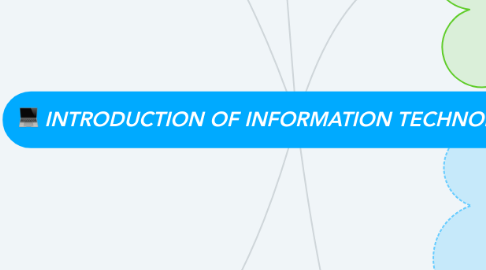
1. CATEGORIES OF COMPUTERS
1.1. supercomputer
1.1.1. fastest and most powerful computers. Capable to process more than one quadrillion instructions in a single second
1.2. mainftame
1.2.1. large, expensive, powerful computer that can handle hundreds or thousands of connected user simultaneosly
1.3. personal computer
1.3.1. a computer that can perform all of its input, processing, output and storage activity
1.4. mobile computer & devices
1.4.1. personal computer that you can carry from place to place
1.5. embedded computers
1.5.1. special purpose computer that is function as a component in a larger product
2. CHARACTERISTICS & CAPABLITIES FOR DIFFERENT CATEGORIES
3. SUPERCOMPUTER
3.1. physical size
3.1.1. occupy a full room of equipment
3.2. speed
3.2.1. tens of thousands of processors
3.3. storage
3.3.1. extremely large storage(3.1 PETA BYTE)
4. MAINFRAME
4.1. physical size
4.1.1. occupy partial room to a full room equipment
4.2. speed
4.2.1. dozens of processors
4.3. storage
4.3.1. very large & addable storage(4.6 TERA BYTE)
5. PERSONAL COMPUTER
5.1. physical size
5.1.1. fits on a desk
5.2. speed
5.2.1. single processors(1.5-2.5 Ghz)
5.3. storage
5.3.1. large(500 GIGA BYTE)
6. MOBILE COMPUTER
6.1. physical size
6.1.1. fits on your lap or in hand
7. MOBILE DEVICES
7.1. physical size
7.1.1. fits in the palm of your hand or a pocket
8. EMBEDDED COMPUTERS
8.1. PHSICAL SIZE
8.1.1. miniature. it is a mounted on a circuit board and then installed in a machine or appliance using wires to carry input
9. DEFINITION IT
9.1. the use of computer hardware and software to store,retrieve and manipulate information
10. ADVANTAGES & DISADVANTAGES
10.1. ADVANTAGES
10.1.1. Speed
10.1.2. consistency
10.1.3. reliability
10.1.4. communication
10.1.5. storage
10.2. DISADVANTAGES
10.2.1. violation of privacy
10.2.2. public safety
10.2.3. impact on labour force
10.2.4. health risk
10.2.5. impact on environment
11. APPLICATION OF IT
11.1. EDUCATION
11.1.1. learning management system (LMS)
11.1.2. computer based training
11.2. FINANCE
11.2.1. finance investment system
11.2.2. online banking
11.3. GOVERNMENT
11.3.1. E-filing
11.3.2. HRMIS
11.3.3. E-syariah
11.4. HEALTH CARE
11.4.1. medline
11.4.2. counter registration system
11.4.3. telemedicine
11.4.4. telesurgery
11.5. SCIENCE
11.5.1. virtual reality
11.5.2. hawk eye officiating system
11.5.3. neural network
11.6. PUBLISHING
11.6.1. online newspaper & online magazine
11.7. TRAVEL
11.7.1. global positioning system (GPS)
11.7.2. online reservation
11.7.3. E-ticketing
11.8. MANUFACTURING
11.8.1. computer-aided design
11.8.2. computer aided manufacturing

